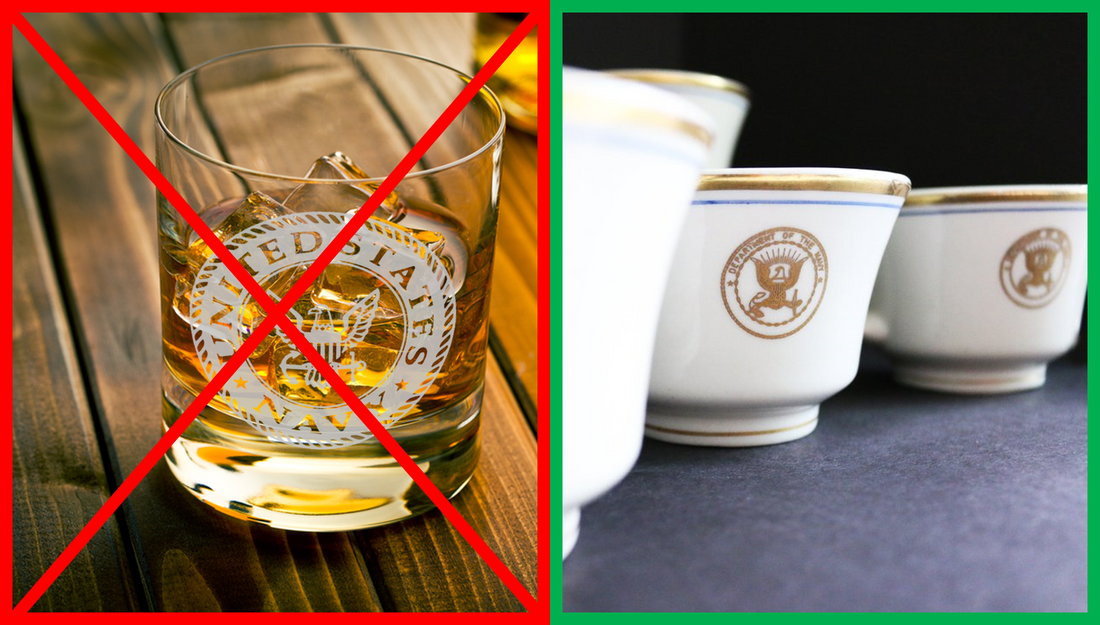
Goodbye Grog, Hello Joe!
This month, we celebrate the end of an era… of alcohol aboard ships! Wait! Why’s that? Because we are a coffee company of course! Let’s tell you the sea story…
Initially the U.S. Navy continued the tradition of a daily rum ration (inherited from Britain’s Royal Navy). Starting in 1794, when the U.S. Navy was officially established, Sailors were given “one half-pint of distilled spirits” per day. The Navy encouraged Sailors to drink American made whiskey since it was cheaper than imported rums. American Sailors also had the option of forgoing their spirit ration and receiving an additional three to six cents a day in wages.
In 1842, the spirit ration was reduced to four ounces. In 1862, during the Civil War, the U.S. Navy abolished the daily spirit ration. The Confederate Navy, however, continued the tradition (mostly because many British Sailors served in the Confederate Navy during the Civil War).
Sailors, however, could still purchase alcoholic beverages for their own use, and wine and spirits continued to be available in the officers’ wardroom.
Restrictions on alcohol use in the navy got progressively stricter. Finally in 1914, Secretary of the Navy Josephus Daniels issued General Order 99 which stated, "The use or introduction for drinking purposes of alcoholic liquors on board any naval vessel, or within any navy yard or station, is strictly prohibited, and commanding officers will be held directly responsible for the enforcement of this order."
The order went into effect on the 1st of July, and the U.S. Navy has been drinking coffee ever since. And THAT is why we are celebrating!
Take a look at our friends at The Bourbon Road: The Bourbon Road (@thebourbonroad) • Instagram photos and videos to explore some of the best American distillations! And might we suggest adding a li'l something to your Old Salt Coffee??
What about grog?
Well, in 1740, a Royal Navy Vice Admiral named Edward Vernon, who was then in command of the West Indies Naval Squadron, became concerned about the high state of drunkenness among British Sailors. He changed the daily rum tot by mixing the half pint with water in a 1 to 4 ratio and splitting it into two portions – one in the morning and one in late afternoon.
Vernon was famous for wearing an overcoat made from a waterproof cloth called grogram during his inspections of the ships in the squadron. His signature coat earned him the nicknames “Old Grogram” and “Old Grog.”
In time, the mix of rum and water adopted by Vernon came to be called grog. The term was later also applied to the mix of rum, water, lime juice and sugar that was doled out to Sailors to prevent scurvy. Grog is also the root of the term groggy. That was a pretty good description of what happened to Sailors who drank too much grog.
Here are a few other slang terms that came about courtesy of naval traditions:
Groggy – Grog is a concoction of rum, water and citrus juice that was originally drunk by British Sailors and adopted by the U.S. Navy as a way to make stagnant water more palatable and to fight scurvy. Someone who is dazed or sleepy might feel as if they have had too much grog, making them “groggy.”
Three sheets to the wind – Sheets on a ship are the ropes that control the sails. If a sheet becomes loose and starts flapping in the wind, the ship will lurch and rock. Someone who is cannot walk a straight line because they are staggering drunk is said to be “three sheets to the wind.”
Splice the main brace – The main brace was the largest of the rigging on the ship and essential to controlling the vessel. A damaged main brace was difficult to repair, particularly in the midst of battle, so it became customary for the crew members who successfully spliced it to be rewarded with an extra ration of rum. The phrase came to mean a celebratory drink.
Binge – To binge while on a ship meant to soak and rinse an empty cask in water. Sailors who needed more alcohol than their allotted ration would drink the binge water from rum casks in hopes that it would contain at least a few drops of booze. Binging also caused the wood to absorb water, much like a person binge drinking in the modern sense absorbs alcohol.
Down the hatch – When Sailors threw their heads back and poured alcohol down their throats, they equated it to manner in which cargo was loaded on ships by lowering it through the hatches on the deck.
Mind your Ps and Qs – Popular folklore states the phrase refers to barkeeps having to be sure to track the “pints” and “quarts” ordered by Sailors, but it more likely stems from the printing industry’s need to avoid accidentally reversing the letter blocks for “p” and “q” on the press.
Cup of Joe – The common story that the term “cup of joe” for coffee originated from Secretary of the Navy Josephus Daniels’ order to prohibit alcohol in the fleet is probably a myth. The more plausible theory is that “joe” derives from “jamoke” – another nickname that was formed by combining the names of the coffee producing locations of Java and Mocha.

